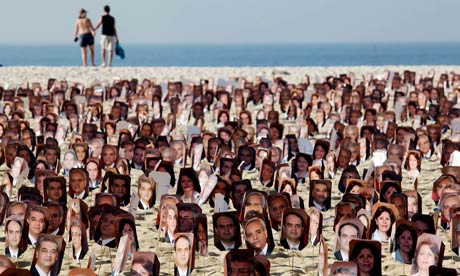The Bahá’í community has faced repression for years in an Iran that seeks to control private thought and beliefs
 Omid Djalali,
Omid Djalali, ![]() guardian.co.uk, 10 July 2011
guardian.co.uk, 10 July 2011
Back in the mid-90s in my show I’m A Short Fat Kebab Shop Owner’s Son, I touched on cultural clashes that shaped my personality as an Iranian immigrant in Britain. Authenticity is paramount for a comedian, and as I prepare to tour a new standup show I’m getting braver: this time, I will be exploring what it is like to be an Iranian born into a Bahá’í family.
The plight of the Bahá’í community in Iran has served as a backdrop to my life growing up in London, particularly since the Islamic revolution in 1979.
Bahá’ís follow teachings that include the oneness of humanity and the unity of religion. This worldwide community – Bahá’ís of almost all backgrounds live in 188 countries – is striving to contribute to the betterment of the world through an educational process that seeks to raise capacities within populations to take charge of their spiritual, social and intellectual development, thus bringing positive change to their communities.
Iran, however, has not looked kindly on the Bahá’ís. There are currently about 300,000 Bahá’ís in Iran (the country’s largest religious minority) and the community has suffered brutal repression since its inception in 1844. After the revolution of 1979 this became a state-sanctioned campaign of persecution, and there have been hundreds of executions and arrests.
In the mid-80s, at university in Northern Ireland, I experienced the ripples of what was happening in Iran in the unlikely setting of a five-a-side football team called “The Persian Empire”, a team of Iranians guys bonding over our heritage and a love of football. I was their star player (in the days when I was four stone lighter). After casually revealing my Bahá’í identity to my team I was dropped. I was shocked that the tentacles of oppression and prejudice had reached as far as Northern Ireland.
Nowadays, the climate feels different. In February 2009 a group of Iranian intellectuals, writers, activists and artists signed an open letter to the Bahá’ís stating their regret concerning the Iranian government’s treatment of its Bahá’í minority. They made an open apology for their silence during Iran’s long-running persecutions: “a century and a half of oppression and silence is enough”. This letter was welcomed by the Bahá’ís, who have always made it clear they are humanitarians, not political activists, working towards social transformation for all at a grassroots level, not concerned with overthrowing governments.
Which is why the arrest in May 2008 of seven Bahá’í leaders seems all the more ridiculous. These individuals were imprisoned with minimal access to lawyers for a year. Their lawyer, Nobel peace prize winner Dr Shirin Ebadi, said there was no evidence for their alleged crimes against the state, and yet they each received 20-year prison sentences. After international condemnation their sentences were reduced to 10 years. But the Iranian authorities restored the full sentences in March of this year as soon as the world’s attention shifted to the Arab spring.
So as I’m writing my show, and pondering on whether there’s any comedy to be gained from all this, the only thread I’ve come up with is: “Iran clearly has control issues.” A memorandum from 1991 signed by the supreme leader, Ali Khamenei, states that the Bahá’í community should be dealt with in such a way “that their progress and development are blocked”, and stipulates that Bahá’ís be denied livelihoods and university education.
As my own daughter celebrates the end of her A-levels with her friends and looks forward to university, perhaps there is a similar backdrop now to her life. I’m reading about the shutting down of the Bahá’í Institute for Higher Education, an online programme set up in 1987 to support the Bahá’í youth as they are barred from universities. A few weeks ago the authorities raided 39 homes of Bahá’ís who operated the institute and 12 people were arrested.
If I was to even attempt to find humour in any of this, it would be to highlight the absurdity of a mentality that seeks to control private thought and beliefs. The seven leaders, as well as the many other Bahá’ís currently in prison, could all be released if they simply recanted their faith. The fact they choose not to means they are holding on to who they are, showing authenticity to the highest degree. They’re a bit different from me who, in 1979, temporarily changed my name from Omid Djalili, Iranian Bahá’í to Chico Andolini, Italian Catholic to save face in the playground.
—
Source: http://www.guardian.co.uk/commentisfree/belief/2011/jul/10/bahai-iran-repression

August 7, 2011 3:59 pm
I as an Iranian Baha’i have seen the persecutions first hand. My great grand father’s ears were cut, because he refused to recant his religion.
The Iranian Baha’is are not involve in politics, they spend all their efforts to “carry forwaed an ever advancing civilization.” I can site my father’s sacrifices as a good example. He was a family physician for over 45 years in Esfahan. The people of his town testify to his high morals, his 24 hours a day ready to heal the poor without charge, and even pay for their medications.
I hope that one day very soon,the gentle people of Iran raise their voices in defense of these innocent largest religious minority, the Baha’is.